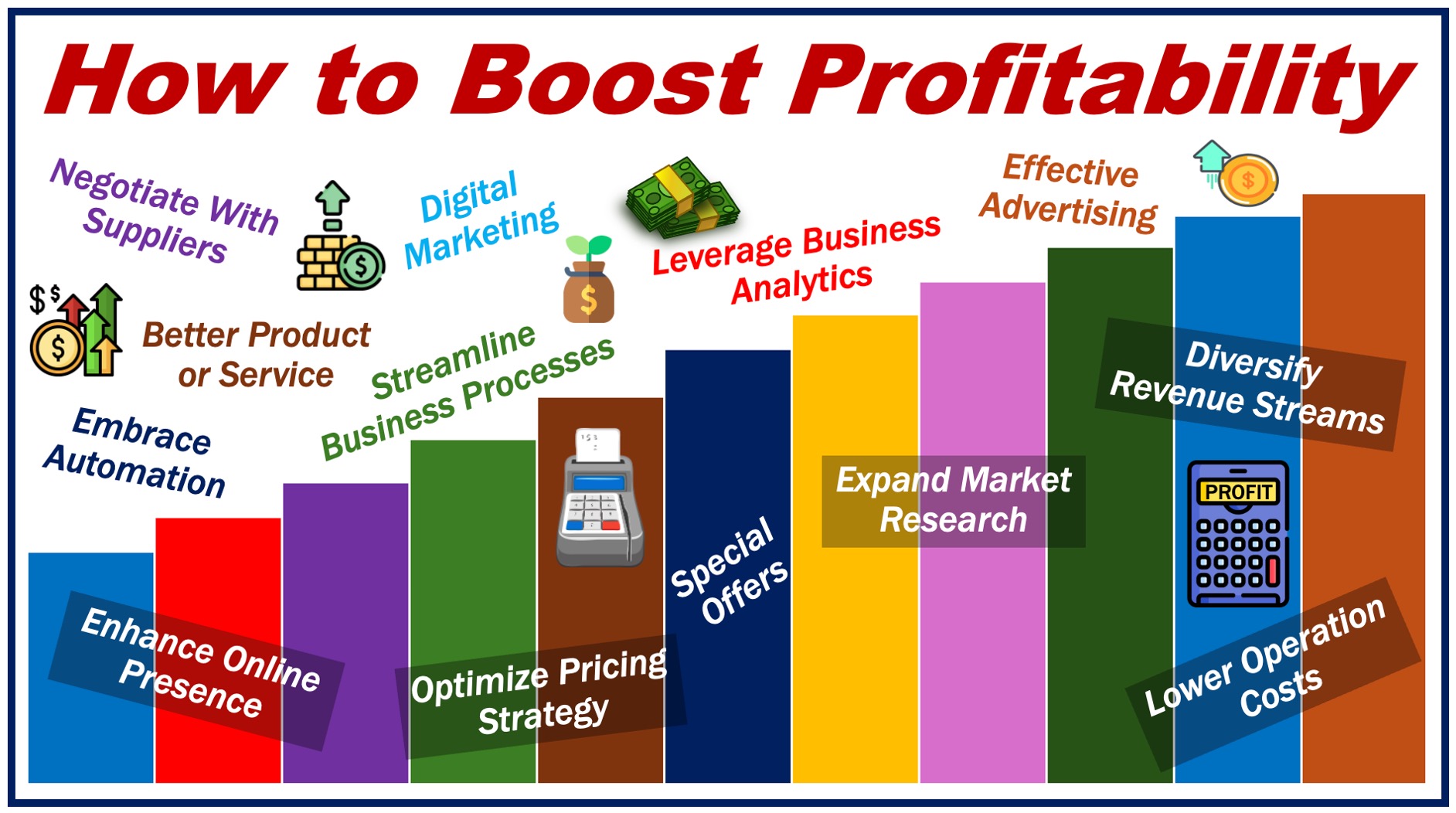A company’s Profitability is how well it generates a profit – its ability to make a profit. When your company has high profitability, it makes a good profit. If it has low profitability, it struggles to make a profit.
If your company is making a loss, you may need to reorganize it to improve its profitability.
In basic terms, profitability tells you whether your company is making more money than it spends. If your business generates a surplus after its expenses are paid, it is profitable.
The Cambridge Dictionary has the following definition of “profitability,” plus an example sentence containing the term:
“1. the situation in which a company, product, etc. is producing a profit. 2. The fact that something produces or is likely to produce a profit. Example Sentence: ‘They are reorganizing the company in order to improve profitability.'”
The Importance of Profitability
In the world of business, profitability is crucial for several reasons:
-
Survival
If your business is not profitable, it cannot pay its bills or employees. It will not survive. Profit is as essential to a business as gasoline is to a car or oxygen is to a human.
-
Growth
Profits fuel expansion. An unprofitable business will struggle to break into new markets, open new locations, develop new products, or hire more staff.
-
Attracting Investors
Companies that consistently turn a profit are more likely to attract investors.
-
Employee retention
Profitability allows for better work conditions and opportunities, enhancing employee satisfaction and retention.

Measuring Profitability
There are several ways we can calculate profitability. Here are the most common ones:
-
Gross Profit Margin
This tells you how much profit a company makes on each dollar of sales, before taking all other expenses into account.
We calculate it by subtracting the cost of goods sold from total sales and then dividing the result by total sales.
-
Net Profit Margin
This looks at the “bottom line” profit, what’s left after all expenses, including things like taxes and interest, are deducted.
We calculate it by subtracting all expenses from total sales and then dividing the result by total sales.
-
Return on Assets (ROA)
This measures how effectively a company uses its assets (like buildings and equipment) to generate profit.
We calculate it by dividing net income by total assets.
Improving Profitability
These tips may help you boost your company’s profitability:
-
Raise Prices
If you raise your prices, your company’s income will rise. However, you need to ensure that your customers are willing to pay more, otherwise you could be in trouble.
-
Cut Costs
Look for areas where you can reduce spending without sacrificing quality or service. Examples include asking your suppliers for discounts, reducing energy costs, automating repetitive tasks, and outsourcing non-core activities.
-
Expand Your Offerings
If you widen your range of products or services while managing to keep costs under control, you can make more money.
Exploring the Derivatives of ‘Profit’
“Profitability” is derived from the word “profit,” which has many variants. Let’s explore these derivatives, their meanings, and see how they can be used in sentences:
-
Profit (noun)
The financial gain after expenses are subtracted from revenue.
Example: “The company reported an annual profit of two million dollars.”
-
Profitable (adjective)
Yielding profit or financial gain.
Example: “They found a profitable niche in the market, selling eco-friendly products.”
-
Unprofitable (adjective)
Not profitable; not yielding profit or financial gain.
Example: “The venture turned out to be unprofitable, causing the company to rethink its strategy.”
-
Profitability (noun)
The state or condition of yielding a financial return.
Example: “The profitability of the new division has exceeded our expectations.”
-
Unprofitability (noun)
The state of being unprofitable.
Example: “The unprofitability of the project was clear after the first financial quarter.”
-
Profiteer (noun)
A person who seeks or obtains excessive profits, especially through unethical means like price-gouging during shortages.
Example: “During the crisis, unscrupulous profiteers were charging triple the normal price for basic necessities.”
-
Profiteering (noun)
The action of making a profit by unethical methods, especially in circumstances of scarcity or crisis.
Example: “The government introduced regulations to curb the profiteering that was rampant during the emergency.”
-
Profitlessly (adverb)
In a manner that yields no profit.
Example: “Despite their efforts, the business operated profitlessly for the first year.”
-
Profit-making (adjective)
Intended to make a profit.
Example: “They launched several profit-making initiatives to boost the company’s bottom line.|
-
Profited (verb)
Gained benefit or money.
Example: She profited greatly from her investment in the tech startup.
-
Unprofited (adjective)
Not having gained profit or benefit.
Example: “Despite the team’s hard work, they remained unprofited by the end of the fiscal year.”
Final Thoughts
Profitability is the lifeline of any business. By understanding how profitability works, you can make smarter decisions that drive growth and long-term success.
